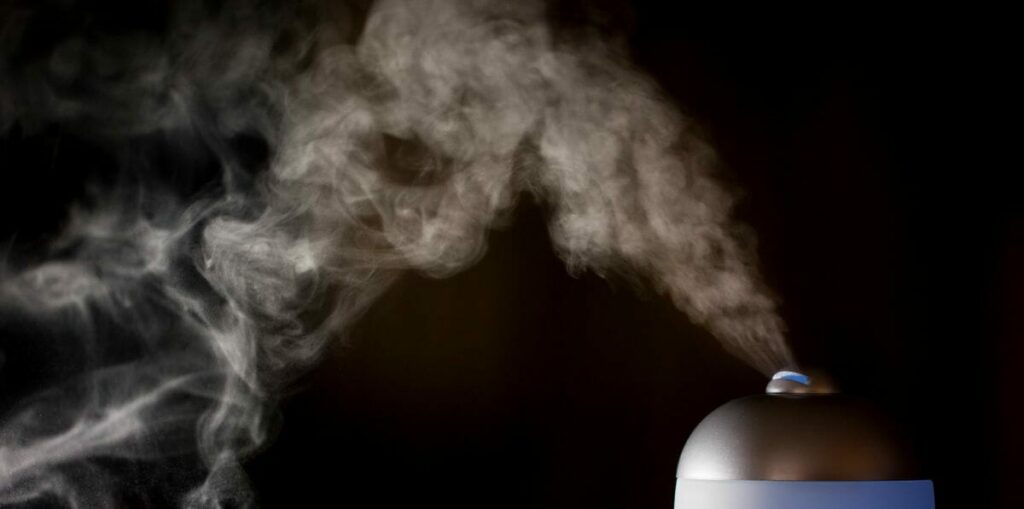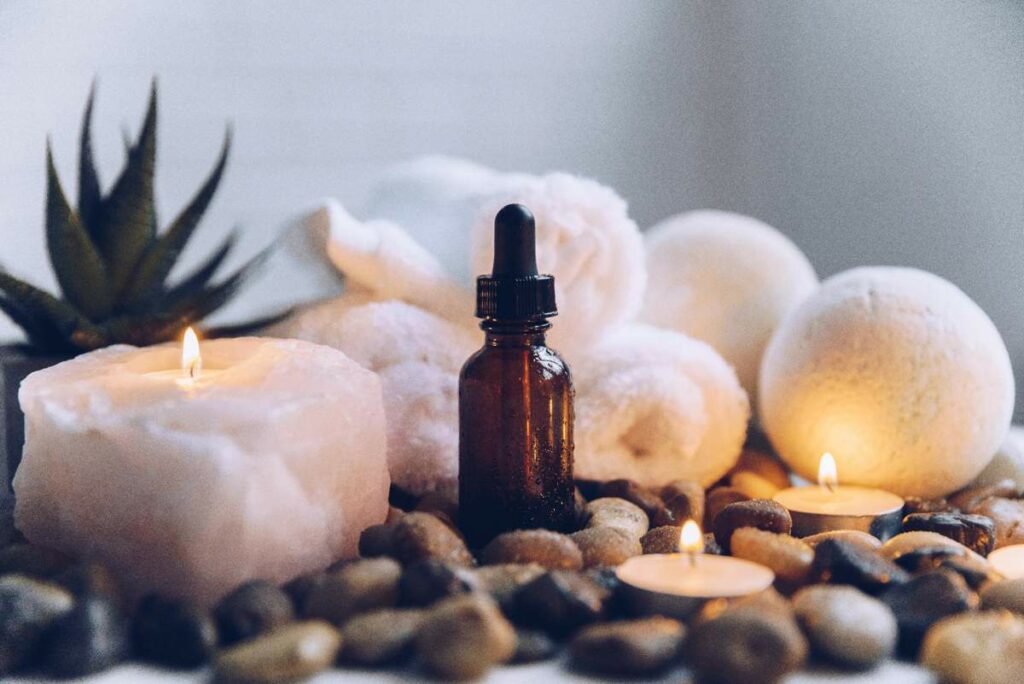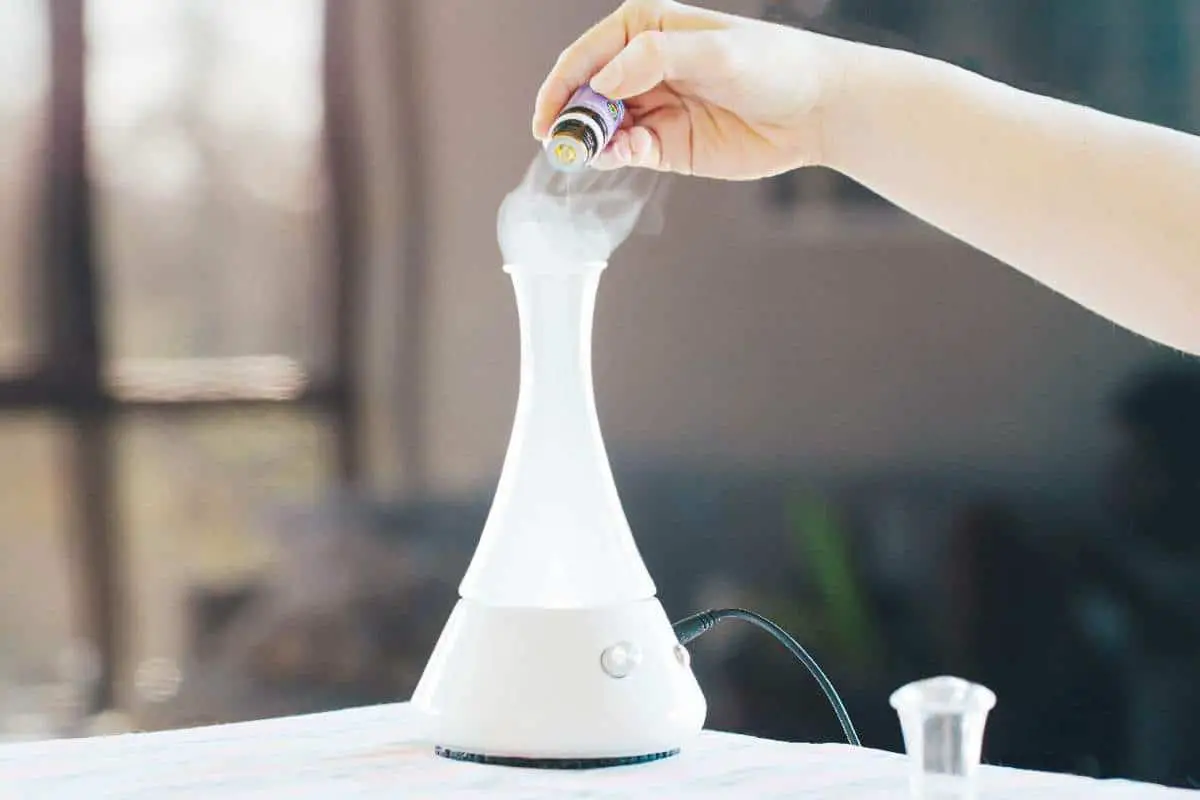Essential oils have been becoming increasingly popular. They give the air a different smell and make many people feel better. Lavender in particular alters brain activity and lowers anxiety levels, as I discuss later in this article.
As a general rule starting with 3 drops per 100 ml water is usually about right for an ultrasonic or nebulizing diffuser. For an evaporative diffuser or heat diffuser start with 1 drop per 10ml of carrier oil. You may wish to increase the dose but do not exceed the essential oil manufacturer’s specifications.
The upper limit of the amount will vary from oil to oil as essential oils are not standardized. They vary because-
- Different processes of extracting oil. Extraction can be by crushing (different pressures may be used) the plant or steaming.
- Other chemicals may be added-especially a problem with “fragrance oils” which are not suitable for aromatherapy.
This lack of uniformity in essential oils is because there is no regulatory body ensuring that standards are uniform.
So starting low and working up is the basic approach, but what happens if you add too much?
What Happens to You or Your Family if You Add Too Much Oil to Your Diffuser?-Can Breathing Essential Oils be Harmful?
As a general rule, breathing essential oils can be harmful if the concentration in the air is very high. There are also specific groups of people, including pregnant women, babies and children, who are particularly vulnerable. There may be long-term harms from breathing some essential oils-not enough good long-term data has been collected to rule this out.
The main danger of adding more and more essential oils to the diffuser or not having a room that is ventilated adequately is that of an overdose of the essential oil.
This may cause-
- Nausea or vomiting
- Irritation of the lungs
- Dizziness
- Headaches
- Eye irritation
To help prevent overdoses when using a diffuser, diffuse the essential oil for 30 minutes then stop for 30 minutes. Then repeat this cycle of 30 minutes diffusing and 30 minutes off.

Certain essential oils can have unanticipated problems for some groups of people who may react particularly badly to a vapor that is too rich from adding too many drops of essential oil to a diffuser-
Specific Groups of People That Should Avoid Specific Oils
Here are 2 examples of particular problems with 2 oils-
- People on some common medications. Aromatherapy with peppermint oil can inhibit an enzyme system in our bodies that breaks down many medications, CYP3A4. So if you are on a medication which this enzyme system breaks down and you inhale peppermint oil vapor the plasma level of the medication will tend to rise. So you or anyone else inhaling the peppermint oil could be effectively overdosing on your/their medication. This affects quite a few common medications.
- People with G6PD deficiency-a genetic enzyme deficiency that leads to the breakdown of red blood cells in response to certain stresses/exposures to compounds.
- Young children-Children less than 30 months can become agitated
- People with fast heart beats-can be adversely affected
Lavender Essential Oil
In experiments lavender oil reduces neurotransmission in the brain with a particular neurotransmitter called acetylcholine. In humans, medication that reduces acetylcholine neurotransmission is with an increased incidence of dementia. So it would seem wise to avoid lavender oil in households with people who have any memory problems.
There will be similar information for other oils which you should check before exposing other people to essential oils.
Specific Groups of People That Should Avoid Inhaling Essential Oils in General
Children, babies and pregnant women. As Johns Hopkins points out, peppermint oil inhalation can cause children less than 30 months old to become agitated.
People With Respiratory Disease-some essential oils contain phenol that can irritate the respiratory tract. Examples of these are eucalyptus and peppermint. This can be a particular problem for babies. Also other chemicals called terpenes in essential oils can make the function of airways in the lungs worse in both normal people and asthmatics.
People With Allergic Tendencies-people can be allergic to essential oils. This is commonly seen when the oil is applied to the skin, particularly undiluted essential oils. However, it is also possible to have an allergic reaction to inhaling essential oil.
People With Other Health Problems-they should check with their doctor that exposure to the essential oil will not be harmful. For example, liver and kidney problems can both potentially lead to higher concentrations of the essential oil in the bloodstream.
It is for these reasons that Johns Hopkins advises against using essential oil diffusers. They point out that diffusion in households with more than one person different people can be affected. Favouring instead-
- Aromatherapy accessories, necklaces, bracelets and other objects with absorbent pads to which essential oils are applied
- Body oil-a mixture of essential oil and carrier oil
- Aroma Sticks-plastic sticks with absorbent material that take up essential oil
If you add too much oil to your diffuser and start experiencing symptoms, you should immediately go out of the room into fresh air. When you’re feeling better come back into the room holding your breath to switch the diffuser off and open the windows. If you want to save the oil and water mixture that you have in the diffuser because of the expense of the essential oil then pour it into an airtight jar. When you use the oil/water mixture next time you will need to dilute it.
What Happens to Your Pets if You Add Too Much Oil to Your Diffuser?
Dogs and cats have senses of smell which are much more sensitive than ours. In fact, the dog has 300 million olfactory (smell) receptors whereas we have 6 million in our noses. So you may need to be careful not to overpower your pets’ sense of smell.
Also, certain essential oils are not good for animals. Peppermint oil can be toxic for pets including cats and dogs.
What Happens to Your Essential Oil Diffuser if You Add Too Much Oil
If you add too much essential oil to the diffuser it may also create problems for the diffuser-
- The oil may clog up the diffuser mechanism e.g. nebulizing diffusers or ultrasonic diffuser
- More essential oil residue will accumulate inside the diffuser and make it more difficult to clean. You may need to use a solvent to clean the diffuser such as rubbing alcohol if compatible with your diffuser.
The smell is too weak-shall I add more essential oil to my diffuser?
It depends on the cause. It may be that you have too little essential oil in a diffuser but other possible causes are-
Your sense of smell is not good
To check this, see if other people find the scent of essential oil is too weak as well. Sense of smell is influenced by genetics, decreases as we age and is worse in people who have been exposed to high particulate air pollution. By checking with other people, at least you will prevent yourself overdosing on essential oils.
Your sense of smell has become habituated to the essential oil
After a while a smell that was initially very noticeable becomes less noticeable. Smell, like most of our senses, becomes habituated to the current state. So after a while you will notice the smell less. Rather than add more drops of essential oil to your diffuser it is better to turn the diffuser off. Go somewhere where the oil is not in the atmosphere for 30 minutes to allow your sense of smell to recover. Then come back switch the diffuser on and judge whether the smell is about right.
Your diffuser is too small for your room
Rather than add more essential oil to your current diffuser which may damage its mechanism you may need to buy a larger diffuser with the greater output of mist.
There is too much airflow through your room carrying the diffused essential oil out of the room.
However, you should be careful not to have a completely closed room so the concentration of the essential oil in the air does not become too high.
An air purifier is removing the essential oil from the air.
Most air purifiers have activated carbon filters which will remove chemicals such as essential oils from the air. If you switch the air purifier off, then you will be breathing in an increased level of particulate pollution. So the best option is to remove the carbon filter if this is possible without disrupting the particulate filtration of the air purifier. I have written a article about this here.
So you can see there are other possibilities other than having too little oil in the diffuser. Some of these may be easier to correct. It will be cheaper and safer to correct these problems than just adding more oil to the diffuser.
How to Add Drops of Essential Oil to your diffuser
- Take off the lid check the diffuser is clean-particularly no mold growing in it
- Fill to the fill line with distilled water assuming it is a water based diffuser.
- Put in the correct number of drops of essential oil you will need to read the manufacturer’s instructions but usually this will be 3 drops per 100mls
- Fix the top back on
- Put the diffuser on a high shelf so that the diffusate enters the air circulation in the room
How many drops of essential oil in 1 ml?-20 drops
How many drops of essential oil in 5 ml?-100 drops
Here is a table of number of drops for different volumes-
| Volume (in ml) | Number of Drops of Essential Oil |
| 1 | 20 |
| 2 | 40 |
| 3 | 60 |
| 4 | 80 |
| 5 | 100 |
| 10 | 200 |
| 14 | 300 |
| 20 | 400 |
Do You Need a Carrier Oil For a Diffuser?
On the whole you will only need a carrier oil for a heat diffuser or an evaporative diffuser. In ultrasonic diffusers and nebulizing diffusers the essential oil is added to water.
Conclusion
Diffusing essential oils is a tradeoff of pleasure from the smell versus any health risks from inhaling the oil. For health problems except allergic reactions, this trade off can be improved by adding the correct number of essential oil drops to your diffuser.
For a diffuser using water to carry the oil into the atmosphere add 3 drops per 100ml. In the case of a diffuser using a carrier oil, use 1 drop of essential oil per 10ml carrier oil to start with.
If you wish to increase the dose, then as essential oils differ from each other you will need to look at the manufacturers recommendations.
Frequently asked questions
Related posts
Humidifier vs Diffuser? This article considers the differences between a humidifier and a diffuser and the ways that you can use essential oils in a humidifier.

Can I use essential oils in an air purifier?-this article covers the ways around the difficulty that most air purifiers try to remove chemicals and so essential oils from the air


